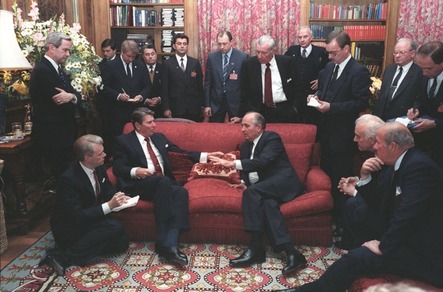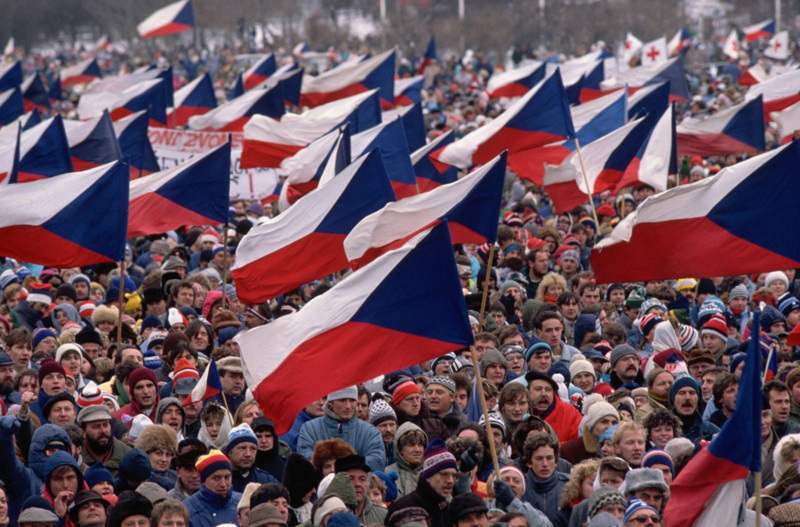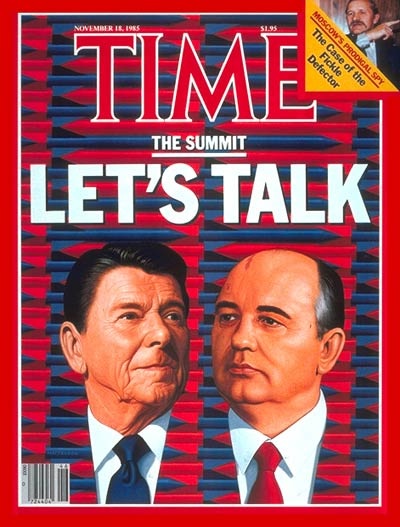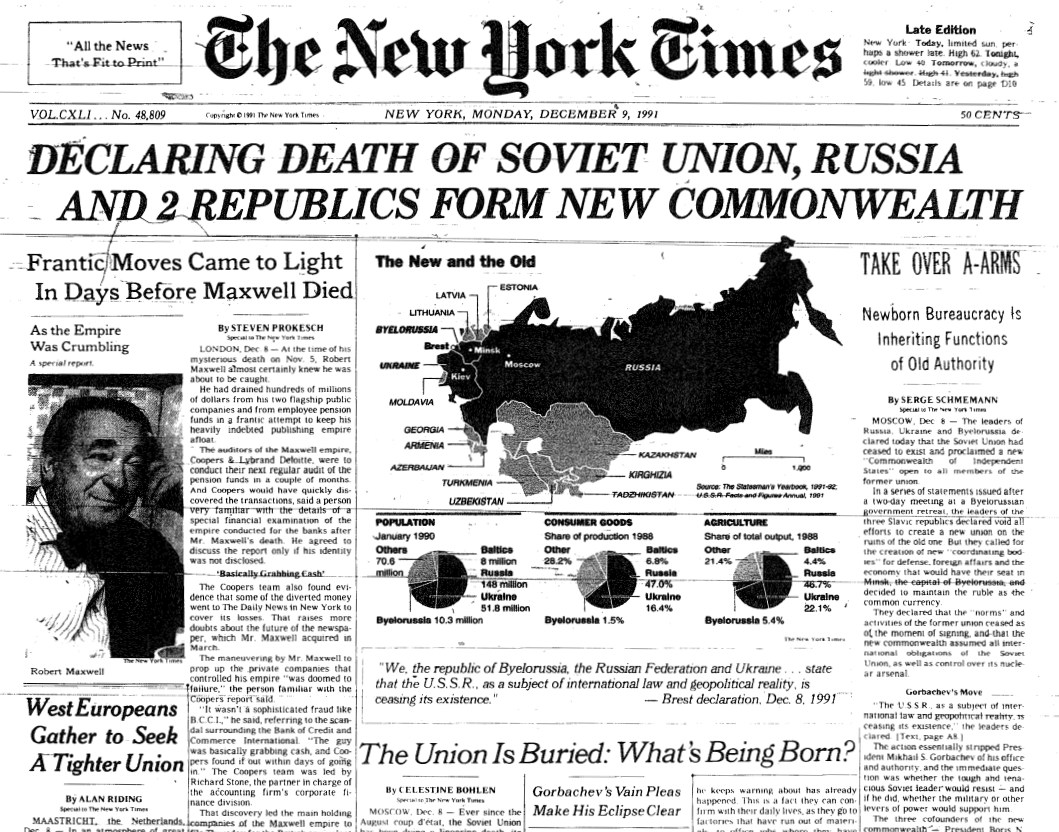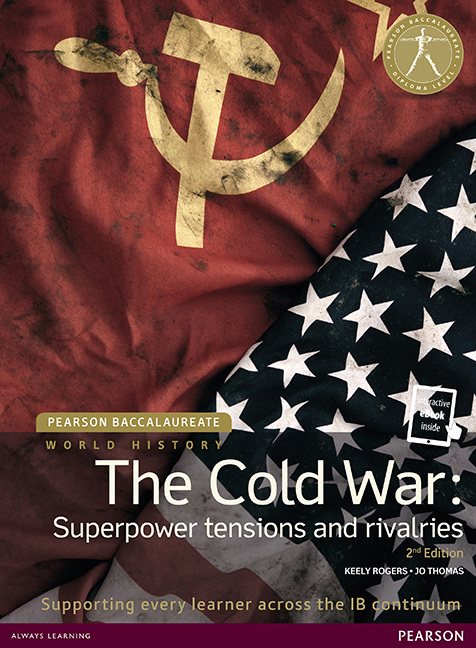Lesson Objectives
To identify and evaluate the long and short-term causes of the collapse of the USSR
To identify and evaluate the long and short-term causes of the collapse of the USSR
Key Features of the End of the Cold War
|
Mikhail Gorbachev
|
Ronald Reagan
Events of 1989
|
Causes of the End of the Cold War
|
Long Term Causes: Economic Collapse
Long Term Causes: Ideological Collapse
|
Long Term Causes: Social Collapse
Long Term Causes: Nationalist Feeling
|
Collapse of communist regimes in Eastern Europe, encouraged calls for independence within the republics of the USSR 1991: Estonia, Latvia, and Lithuania all declared independence from Russia, Gorbachev became deeply unpopular due to his inability to improve the economy
|
USSR was formally dissolved, being replaced by the Commonwealth of Independent States (CIS), Russia became the Russian Federation with Boris Yeltsin as its first President |
Textbook Activities
|
Activity 1
"Mikhail Gorbachev and Ronald Reagan made many mistakes at the summit. But their personal chemistry, the relations forged between their advisers, and the tenacity with which both sides kept talking all show that summitry can make a difference when properly managed. The encounters that began in frosty Geneva in November 1985 helped ensure that the Cold War ended not with a bang, or a whimper, but a handshake."- David Reynolds, Summits: Six Meetings that Shaped the Twentieth Century, Allen Lane 2007 (page 569) 1. What key points about the importance of the 'summits' are made by Reynolds?
Activity 2 "As former Pentagon officials like Caspar Weinberger and Richard Perle... and other proponents of the Reagan victory school have argued, a combination of military and ideological pressures gave the Soviet little choice but to abandon expansionism abroad and repression at home. In their view, the Reagan military build-up foreclosed Soviet military options while pushing the Soviet economy to the breaking point. Reagan partisans stress that his dramatic Star Wars initiative put the Soviet on notice that the next phase of the arms race would be waged in areas where the West held a decisive technological edge."- D. Deudney and GJ Ikenberry, 'Who Won the Cold War?’ Foreign Policy 87, Summer 1992 (page 124) "The Jimmy Carter- Cyrus Vance approach of rewarding the Soviet build-up with one-sided arms control treaties, opening Moscow's access to Western capital markets and technologies, and condoning Soviet imperial expansion was perfectly designed to preserve the Brezhnev-style approach, delivering the Soviets from any need to re-evaluate (as they did under Gorbachev) or change their policies. Had the Carter-Vance approach been continued... the Cold War and the life of the Soviet Union would almost certainly have been prolonged.'- Patrick Glynn, letter to the Editor, Foreign Policy 90, Spring 1993 (page 171-173) 1. Identify three reasons from the first source to explain why Reagan's policies could be seen as responsible for ending the Cold War
2. What criticisms does Patrick Glynn have of détente?
Activity 3 1. Who do you believed played the most important role in bringing a new relationship between the United States and the Soviet Union- Gorbachev or Reagan
2. Explain what Zubok means, to what extent do you agree with his assertion? "It was Ronald Reagan's luck that his presidency coincided with generational change in the Kremlin and the exit of the Old Guard, Mikhail Gorbachev was the first Soviet leader since Stalin to reappraise drastically the relationship between ideology and Soviet security interests"- Vladislav M Zubok, A Failed Empire: The Soviet Union in the Cold War from Stalin to Gorbachev, UNC Press 2007 (page 341)
|
Activity 5
1. What is the airplane supposed to represent? What is significant about the war the cartoon has drawn the airplane?
2. Who are the passengers supposed to represent?
3. What is enabling Poland to jump out of the airplane?
Activity 6 1. Explain what is happening in the cartoon
2. What is the message of the cartoon regarding events in Eastern Europe?
Activity 9 At what point do you think that it could be said that the Cold War was over? Discuss the implications of each of the following dates and decide which one most appropriately represents the end of superpower hostility (in order of significance)
|
